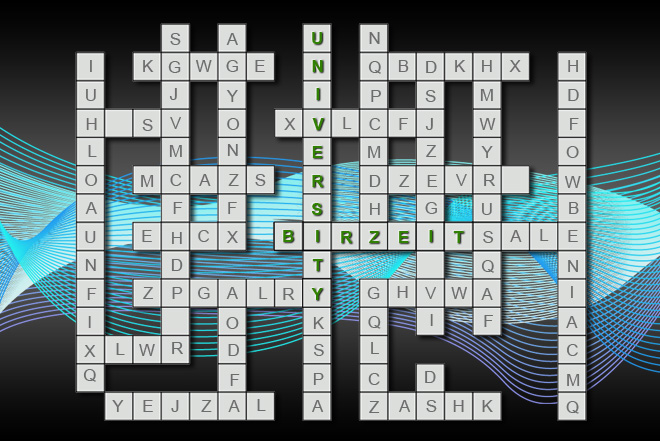Birzeit University Wins an EU-Funded Tempus Project Titled: “Serious Games: Pathway within the Undergraduate IT Programs”
For the second year in a row, Birzeit University Faculty of Information Technology won a European Union-funded TEMPUS competition titled: “Serious Games: Pathway Within the Undergraduate IT Programs.” Last year's winning project focused on developing a master’s degree in software engineering – the first of its kind in the Middle East. This year the IT faculty won the pilot project that aims to build the capacities of the four consortium universities in Tunisia and Palestine by enabling them to develop sustainable curriculum in “Serious Games.”
The project involves a consortium of seven universities:
n Tempus Partner Countries
1. Birzeit University, West Bank, Palestine (coordinator)
2. Al-Quds University, Jerusalem, Palestine
3. University of Sousse, Tunisia
4. University of Sfax, Tunisia
n EU Countries
5. RWTH Aachen University, Germany
6. Utrecht University, Netherlands
7. Stockholm University, Sweden
The project is meant to benefit the staff of the four partner country institutions, and students enrolled in the undergraduate computer science and computer engineering program.
The regional project also aims to enhance cooperation between universities in the area and the EU partner institutions. The EU partners of this project have rich experience in computer gaming and serious games and a successful track record of previous EU and TEMPUS projects, helping to ensure that the consortium will be able to meet the project objectives.
The project duration is 36 months, December 1, 2013 – November 30, 2016, and its budget is around one million Euros.
Birzeit University project coordinator and professor of computer science at the Faculty of Information Technology Yousef Hassouneh said that the main objectives of the project are to empower human and material capacities of partner country universities to develop a set of courses in serious games that can be taught as a pathway within current IT programs; to train faculty staff, to establish a teaching environment with a sophisticated and reformulated pedagogical approach; and to enable university graduates to meet labor market challenges and economy needs.
"A serious game or applied game is a game designed for a primary purpose other than pure entertainment,” Hassouneh added. “The ‘serious’ adjective generally refers to products used by industries like defense, education, scientific exploration, health care, emergency management, city planning, engineering, religion, and politics.”
"We aim at developing a set of eight courses that lead students to be professional in serious gaming,” he went on. “This is intended to be done in collaboration between the different partner universities in Palestine, Tunisia and Europe.”
The specific objectives of the Project are:
1- To develop and implement the total of 8 courses in Serious Games in partner country universities, using e-learning in teaching.
2- To develop serious games teaching case studies with emphasis on educational game, and integrate them to the pathway courses.
3- To promote the adoption of the Bologna system (together with QA procedures and ECTS ).
4- To improve the human capacity of partner country universities by providing research collaboration opportunities with European Union (EU) staff members through jointly supervision of students’ projects.
5- To create opportunities of collaboration between the academia and the industry in serious games field.
IT faculty Dean Ali Jaber applauded the project. “The software development sector in beneficiary partner universities will greatly benefit from this initiative. It will improve the potential of IT graduates. We think that the end result of this program will be felt both economically and socially. Moreover, the employability of these graduates will improve significantly which in turn will positively contribute to the overall economic situation. In addition, the newly acquired skills and competencies will open doors of innovations and entrepreneurship for fresh IT graduates.”
TEMPUS representative in Palestine Nidal Jayyousi said that this year, 937 scientific project proposals competed to obtain funding from TEMPUS, representing 46 countries of which 171 projects were chosen. Jayyousi added that Palestinian universities succeeded in obtaining funding for seven different projects, among them the project of Birzeit University.
The Palestinian ICT Private Sector 3-Year Strategy and Development Plan prepared by the Palestinian Information Technology Association (PITA ) demonstrates the importance of the Information and Communication Technology (ICT) sector to the Palestinian national economy. Internet and social media have shown tremendous growth during the last few years reflecting actual and potential additional investment opportunities within the sector. ICT contributes to Palestine’s GDP approximately eight percent, while employing three percent of the total workforce. The plan stated that university curricula are not compatible with market needs and need to be upgraded and that there is a need for continuous skill development to keep up with international trends.
Most of the IT academic programs in the region prepare their students to work on data-oriented applications. Such programs focus on teaching programming skills and programming languages in particular, such as Java or C#, or even train them to pass certification exams for Cisco or Microsoft programs. None of these training programs provide training in video game development. The project is intended to create real opportunities for employment among students that are skilled in game design.







